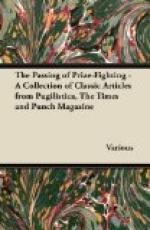* * * *
Arouse my muse! such pleasing themes to quit,
Hear me while I say
“Donnez-moi du frenzy, s’il vous plait!"[4]
Give me a most tremendous fit
Of indignation, a wild volcanic ebullition,
Or deep anathema,
Fatal as J—d’s bah!
To hurl excisemen downward to perdition.
May genial gin no more delight their throttles—
Their casks grow leaky, bottomless their bottles;
May smugglers run, and they ne’er make a seizure;
May they—I’ll curse them further at my leisure.
But for our club,
“Ay, there’s the rub.”
“We mourn it dead in its father’s halls:"[5]—
The sporting prints are cut down from the walls;
No stuffing there,
Not even in a chair;
The spirits are all ex(or)_cised_,
The coffee-cups capsized,
The coffee fine-d, the snuff all taken,
The mild Havannahs are by lights forsaken:
The utter ruin of the club’s achieven—
Our very chess-boards are ex-chequered even.
“Where is our club?” X—sighs,[6] and with a stare
Like to another echo, answers “Where?”
[1] “Ye jocal nine,”
a happy modification of “Ye vocal nine.”
The
nine here so classically invocated are manifestly nine
of
the members of the late club, consisting of, 1.
Mr. D—s
J—d.
2. The subject of the engraving, treasurer and
store-keeper.
3. Mr. G—e S—h, sub-ed.
J—— B——. 4. Mr.
B—d,
Mem. Dram. Author’s Society. 5.
C—s S—y, ditto. 6.
Mr.
C—e. 7. Mr. C—s, T—s,
late of the firm of T—s and
P—t.
8. Mr. J—e A—n, Mem.
Soc. British Artists. 9, and
lastly,
“though not least,” the author of “You
loved me not
in
happier days.”
[2] “He said.”—Deeply
imbued with the style of the most polished
of
the classics, our author will be found to exhibit in
some
passages
an imitation of it which might be considered
pedantic,
for ourselves, we admire the severe style. The
literal
rendering of the ‘dixit’ of the
ancient epicists,
strikes
us as being eitremely forcible here.—PUNCH.
[3] A play-bill reminiscence,
viz. “The scenery by Messrs. Tomkins
and
Pitt.”—THE AUTHORS OF “BUT,
HOWEVER.”
[4] “Donnez-moi,”
&c.—The classics of all countries are aptly
drawn
upon by the universal erudition of our bard. A
fine
parody
this upon the exclamation of Belmontel’s starving
author:
“La Gloire—donnez-moi do pain!”—FENWICK
DE
PORQUET.
[5] “They mourn it dead,”
&c.—A pretty, but perhaps too literal
allusion
to a popular song—J. RODWELL.




